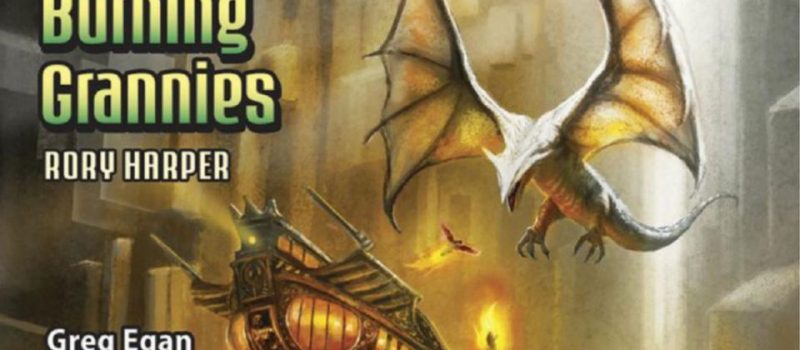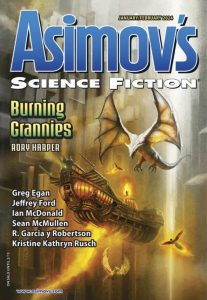A.C. Wise Reviews Short Fiction: Asimov’s
The January/February 2024 issue of Asimov’s is bookended by two novellas, each involving the investigation of a crime. In Kristine Kathryn Rusch’s “Proof of Concept”, Orli is a detective on an intergalactic cruise ship, investigating a seemingly straightforward murder. However, when she arrives at the crime scene, Orli discovers the body is actually a sophisticated hologram, leaving her to unravel what crime has actually been committed, and whodunit. It’s a nice twist on a locked-room mystery that makes good use of its setting to provide a ticking clock element. In “Death and the Gorgon” by Greg Egan, Beth is a sheriff investigating the collapse of a mine repurposed as a cryogenic storage facility, damaging the facility’s clients beyond hope of resurrection. Similar to Orli in Rusch’s story, Beth must figure out whether a crime has even been committed – was the collapse an accident, terrorism, a murder, and who was the intended victim? Both novellas take several unexpected turns along the way, making for satisfying mysteries.
In “Early Adopter” by Zack Be, Matteo has recently installed Preferent, a new technology that interfaces with the user’s brain, allowing them to multitask and network. He’s struggling to differentiate Preferent from his own thoughts, which only gets worse as he goes on a date – his insecurities surfacing and being exacerbated by constant pop-ups from Preferent, sending him into a panic spiral. The story has a strong voice and does a wonderful job of exploring humanity’s relationship with technology, underlining that it isn’t a magic solution and, in some cases, may only amplify existing problems. “It Goes so Fast” by Lisa Papademetriou is another cautionary tale about overreliance on technology. Stella is trying to get her hands on the apartment next to hers so that she’ll have more room for herself and her young son. In her single-minded pursuit of her goal, she increasingly relies on Memorex, a technology that lets her store moments to look back on later. As a result, she increasingly misses her life as it’s happening, including moments in her child’s development and opportunities for genuine human connection.
“The Adherence” by Jeffrey Ford provides a surreal look at disposable technology. After the protagonist’s wife disintegrates due to overexposure to cheaply made products, he is bullied into paying a religious practitioner to bring her back, only to find that the returned version of her is stamped with the mark of the company responsible for making the cheap junk the first place. Rory Harper’s “Burning Grannies” is another surreal piece, following the crew of a ship burning grannies for fuel on their endless patrols to release babies into the universe, in an odd ecosystem of intertwined stages of life.
“Augher, Clogher, Fivemiletown” by Ian MacDonald traces the meteoric rise and fall of an aspiring actor whose talent for voices and accents allows him to tap into “the Voice,” which has an ASMR-like effect, leaving those who hear it feeling warm, fuzzy, and in a highly suggestible state. It’s an interesting premise, and a nice exploration of celebrity culture and the churn of online fame. “Lucifer’s Lode” by R. Garcia y Robertson is a novelette with a story spanning a virtual world mashing up Wyatt Earp with Sherlock Holmes, and the characters’ real lives as commanders in a space fleet. The plots are neatly intertwined, with dangers, allies, and villains, crossing over between the two, making for a fun story with a strong voice, and excellent characters. “The Scalar Intercepts” by Michael Cassutt is a flash piece narrated by an AI observing Earth in its last moments. In “After the Winter Solstice” by Sean McMullen, a group of royal astronomers stay awake during the hibernation season to observe a celestial phenomenon. The story explores the act of observation itself as the characters are forced to confront their own biases and assumptions and look more deeply at situations rather than acting on impulse.
“To Eat Your Own Head” by Nkone Chaka examines the question of nature versus nurture. As a child, Puetso severely burned her younger brother by holding his face against a hot stove. As an adult, she researches near-extinct species, her specialty being the chameleon snake, a two-headed creature that has been known to turn on itself in captivity and devour one of its own heads. The story does a lovely job with its exploration of character, with Puetso’s research mirroring her struggles with rage and her search to understand its roots.
Recommended Stories
“Early Adopter”, Zack Be (Asimov’s 1-2/24)
“To Eat Your Own Head”, Nkone Chaka (Asimov’s 1-2/24)
This review and more like it in the March 2024 issue of Locus.
 While you are here, please take a moment to support Locus with a one-time or recurring donation. We rely on reader donations to keep the magazine and site going, and would like to keep the site paywall free, but WE NEED YOUR FINANCIAL SUPPORT to continue quality coverage of the science fiction and fantasy field.
While you are here, please take a moment to support Locus with a one-time or recurring donation. We rely on reader donations to keep the magazine and site going, and would like to keep the site paywall free, but WE NEED YOUR FINANCIAL SUPPORT to continue quality coverage of the science fiction and fantasy field.
©Locus Magazine. Copyrighted material may not be republished without permission of LSFF.









